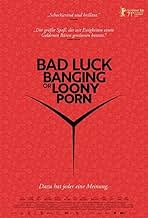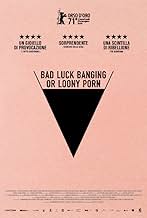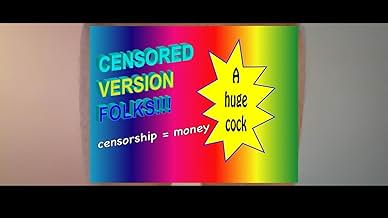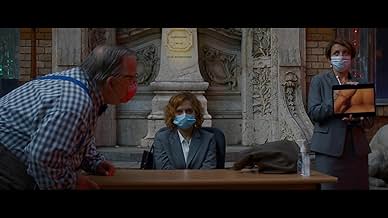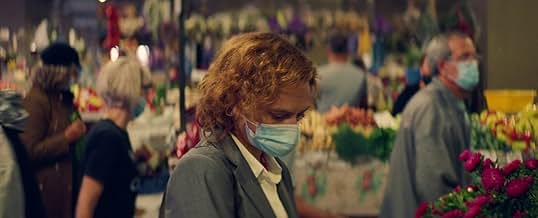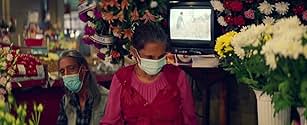CALIFICACIÓN DE IMDb
6.5/10
11 k
TU CALIFICACIÓN
Emi, una maestra de escuela, encuentra su carrera y reputación amenazadas después de que se filtró una cinta sexual personal en Internet. Obligada a encontrarse con los padres exigiendo su d... Leer todoEmi, una maestra de escuela, encuentra su carrera y reputación amenazadas después de que se filtró una cinta sexual personal en Internet. Obligada a encontrarse con los padres exigiendo su despido, Emi se niega a rendirse a su presión.Emi, una maestra de escuela, encuentra su carrera y reputación amenazadas después de que se filtró una cinta sexual personal en Internet. Obligada a encontrarse con los padres exigiendo su despido, Emi se niega a rendirse a su presión.
- Dirección
- Guionista
- Elenco
- Premios
- 8 premios ganados y 21 nominaciones en total
- Dirección
- Guionista
- Todo el elenco y el equipo
- Producción, taquilla y más en IMDbPro
Opiniones destacadas
Because of a leaked sex tape, a teacher finds herself scrutinized and reviled by the system.
Rade Jude is an iconoclast but not a gratuitous director and writer. Halfway through he film he references Pasolini, and that makes perfect sense, the Bunuel from "le charme discret de la bourgeoisie", would have been at home too. This movie is an indictment of our moral hypocrisy, be it pertaining to sexual behavior, but also to social and political constructs, and in a very contemporary manner to all the lies and pretense surrounding our individual ways of handling the Covid pandemic.
This movie is graphic, VERY graphic! If you're easily shocked, see something else. But if you don't mind being provoked, being made uneasy, or even challenged in what you consider proper, as long as it is for a reason, go for it.
I don't want to go in spoiler mode, the movie deserves to be discovered as you see it. However it has three parts, each with its own cinematographic language and esthetics. Each part invites us to consider a different angle of the same issue: our relationship to images, their meaning, and the value, or infamy, we attach to them.
From the opening right in your face use of them, through a contemplative approach of the disconnect between what we see and what we're told we see or what we're told to watch, through an exploration of the lies or over-meaningfulness we create when we associate images and comments on these images, to the absolute hypocrisy of the morally woke and conservative puritans alike when it comes to confronting ourselves to the beyond the surface value of images.
And despite the content it is not at all a boring intellectual movie, it is fun, it is in your face, it is masterfully shot, and it solicits your eyes as much as your brain.
Rade Jude is an iconoclast but not a gratuitous director and writer. Halfway through he film he references Pasolini, and that makes perfect sense, the Bunuel from "le charme discret de la bourgeoisie", would have been at home too. This movie is an indictment of our moral hypocrisy, be it pertaining to sexual behavior, but also to social and political constructs, and in a very contemporary manner to all the lies and pretense surrounding our individual ways of handling the Covid pandemic.
This movie is graphic, VERY graphic! If you're easily shocked, see something else. But if you don't mind being provoked, being made uneasy, or even challenged in what you consider proper, as long as it is for a reason, go for it.
I don't want to go in spoiler mode, the movie deserves to be discovered as you see it. However it has three parts, each with its own cinematographic language and esthetics. Each part invites us to consider a different angle of the same issue: our relationship to images, their meaning, and the value, or infamy, we attach to them.
From the opening right in your face use of them, through a contemplative approach of the disconnect between what we see and what we're told we see or what we're told to watch, through an exploration of the lies or over-meaningfulness we create when we associate images and comments on these images, to the absolute hypocrisy of the morally woke and conservative puritans alike when it comes to confronting ourselves to the beyond the surface value of images.
And despite the content it is not at all a boring intellectual movie, it is fun, it is in your face, it is masterfully shot, and it solicits your eyes as much as your brain.
Jude is the most experimental, controversial and radical romanian filmmaker: his films never cease to offer a poignant satire of society, irredentism, or his country.
His latest film is a prime example of his peculiarities. The subject is a leaked sextape of a teacher, and the scandal it rises among parents.
The opening of the film features the actual footage of an explicit, unsimulated sextape, not for the purposes of realism (as it could have been with any other Romanian New Wave director), but to force the viewer in the act of voyeurism that will be very blatantly shown in the third act: this chapter of the film features a sort of "trial", in which the teacher is forced to face the parents of her students. When one of the parents shows the video to the others with the purpose of "showing things for what they are", the other parents mock the teacher, laugh, or watch with perverse passion. Through this external sight, the viewer is thus confronted with the reaction they probably displayed at the beginning, a very clever way to involve the audience.
The previous two chapters of this three-chapter story each have their own purpose. The second chapter is a sort of glossary/collection of anecdotes, which introduces briefly all the notions that are later mentioned in the discussion of the third act: not only sex or equality related concepts, but domestic violence, history and romanian historical episodes (as that is the teacher's subject), philosophical concepts, even a metacinematic consideration, all with the goal of preparing the viewer for the final act. It is not only a way to put all viewers on the same page, but also to make explicit the thematic range of the film.
The first chapter features Emi (the teacher) walking around Bucharest doing chores. Through her journey, Jude shows the city as it is under the pandemic (the film was entirely shot last year) and its effects of distress on people, more and more nervous, without disdaining some subtle visual digressions.
While Jude makes very clear which side he supports in the debate of the third chapter, he chooses to give three different endings to the story, which I won't disclose, maybe to thus imply that the viewer has to judge for theirself.
His latest film is a prime example of his peculiarities. The subject is a leaked sextape of a teacher, and the scandal it rises among parents.
The opening of the film features the actual footage of an explicit, unsimulated sextape, not for the purposes of realism (as it could have been with any other Romanian New Wave director), but to force the viewer in the act of voyeurism that will be very blatantly shown in the third act: this chapter of the film features a sort of "trial", in which the teacher is forced to face the parents of her students. When one of the parents shows the video to the others with the purpose of "showing things for what they are", the other parents mock the teacher, laugh, or watch with perverse passion. Through this external sight, the viewer is thus confronted with the reaction they probably displayed at the beginning, a very clever way to involve the audience.
The previous two chapters of this three-chapter story each have their own purpose. The second chapter is a sort of glossary/collection of anecdotes, which introduces briefly all the notions that are later mentioned in the discussion of the third act: not only sex or equality related concepts, but domestic violence, history and romanian historical episodes (as that is the teacher's subject), philosophical concepts, even a metacinematic consideration, all with the goal of preparing the viewer for the final act. It is not only a way to put all viewers on the same page, but also to make explicit the thematic range of the film.
The first chapter features Emi (the teacher) walking around Bucharest doing chores. Through her journey, Jude shows the city as it is under the pandemic (the film was entirely shot last year) and its effects of distress on people, more and more nervous, without disdaining some subtle visual digressions.
While Jude makes very clear which side he supports in the debate of the third chapter, he chooses to give three different endings to the story, which I won't disclose, maybe to thus imply that the viewer has to judge for theirself.
'Bad Luck Banging or Loony Porn' is an unorthodox, provocative, scathing piece of moviemaking that due to its low crowd-pleasing coefficient will likely not be for everyone. Since I have no problem with significant amounts of in-your-face-attitude on the director's side, I quite liked it.
Architecturally, the movies borrows from some examples of French Nouvelle Vague Cinema - if I had a better memory, I could tell you exactly which ones - in that the camera frequently and in its center piece completely deviates from the dealings of its protagonists. In this way, a film that starts off with a story about an instance of accidental pornography widens its scope dramatically to become nothing less than a satirical portrait of a pornographic (Romanian, but just Romanian?) society. Using 'pornography' as an abstract (anti-)moral topos reminded me of Samuel Maoz' 'Foxtrot'.
While I think that the dramaturgic fundamentals of the movie are well thought through, I also think the movie could have been even better. Especially in the third part, the discussion of the matter at hand meanders quite a bit, can be tedious, and will probably not escape all charges of weisenheimery.
Bottom line is, that most viewers will probably switch it off at one point in complacent disgust. If you make it to the end, though, you will not see its explosive, weapons-grade finale coming, which is again well in line with its subversive intentions.
Architecturally, the movies borrows from some examples of French Nouvelle Vague Cinema - if I had a better memory, I could tell you exactly which ones - in that the camera frequently and in its center piece completely deviates from the dealings of its protagonists. In this way, a film that starts off with a story about an instance of accidental pornography widens its scope dramatically to become nothing less than a satirical portrait of a pornographic (Romanian, but just Romanian?) society. Using 'pornography' as an abstract (anti-)moral topos reminded me of Samuel Maoz' 'Foxtrot'.
While I think that the dramaturgic fundamentals of the movie are well thought through, I also think the movie could have been even better. Especially in the third part, the discussion of the matter at hand meanders quite a bit, can be tedious, and will probably not escape all charges of weisenheimery.
Bottom line is, that most viewers will probably switch it off at one point in complacent disgust. If you make it to the end, though, you will not see its explosive, weapons-grade finale coming, which is again well in line with its subversive intentions.
The point is clear: our society is shallow and stupid. But the way it was delivered was... Well, shallow and stupid as well. Chaotic scenes, vulgarity just for the sake of 'art', no emotion triggered whatsoever (except a little bit of a disgust actually. Maybe that was the point). Even the quasi-intellectual criticism didn't help. And the third part was intensely tiring trying to fill 30 mins with every typical political discussion full of reading articles from the smartphone. And the three different endings should have been the best part?
Sorry, didn't work out for me. But must say my friend gave it a 10 so... Not for anyone, I guess.
Sorry, didn't work out for me. But must say my friend gave it a 10 so... Not for anyone, I guess.
I watched this movie knowing only the title, and I believe the element of surprise elevated the experience. Without spoiling the story, I can say that this movie is perfectly described as a roller coaster ride.
In the beginning of the ride, you have a steady climb ahead of you, which takes its time to get to a high altitude. You keep going upvery slowly, and all you can see is the track going up. The main character is introduced, and we follow her for a good while.
Then, the roller coaster slows down and halts at the top. There's a change of chapter and you're not sure about what's coming next. A dictionary of different words is displayed through text and visuals, words that aren't necessarily interconnected. Then, when you least expected it, the roller coaster gains a lot of speed and goes all over the place super fast. You don't even have time to process everything that you're seeing and you can't see where this is going to take you. You even get a bit confused and scared about how long this part is going to last, yet you can't escape the ride yet.
Then, when you're shaken up for the rollercoaster, the ride suddenly starts going slower as you get to a more steady track, and you realise that the end of the ride may arrive soon. The story returns to the teacher and we find out her fate. Here, the conservative nature of the Romanian culture is displayed, with moments of humour, frustration and seriousness, with many stereotypes of people showing their true colours and values.
But then... the roller coaster reveals a loop out of nowhere, that leaves you upside down and then the ride ends really abruptly. You don't know what just happened, you don't know how to react and as you're unbuckling your seatbelt and leaving the premises, you're still confused as hell.
This review may be relatable to the people who have seen this movie, yet may leave people who haven't seen it yet really confused. And I'm still confused about this movie myself, and this is the best way I can describe this.
I recommend people to watch this movie. As confused about how to feel about this movie, I think this is an excellent thought-provoking experience which could start a debate about real-life cultural problems.
In the beginning of the ride, you have a steady climb ahead of you, which takes its time to get to a high altitude. You keep going upvery slowly, and all you can see is the track going up. The main character is introduced, and we follow her for a good while.
Then, the roller coaster slows down and halts at the top. There's a change of chapter and you're not sure about what's coming next. A dictionary of different words is displayed through text and visuals, words that aren't necessarily interconnected. Then, when you least expected it, the roller coaster gains a lot of speed and goes all over the place super fast. You don't even have time to process everything that you're seeing and you can't see where this is going to take you. You even get a bit confused and scared about how long this part is going to last, yet you can't escape the ride yet.
Then, when you're shaken up for the rollercoaster, the ride suddenly starts going slower as you get to a more steady track, and you realise that the end of the ride may arrive soon. The story returns to the teacher and we find out her fate. Here, the conservative nature of the Romanian culture is displayed, with moments of humour, frustration and seriousness, with many stereotypes of people showing their true colours and values.
But then... the roller coaster reveals a loop out of nowhere, that leaves you upside down and then the ride ends really abruptly. You don't know what just happened, you don't know how to react and as you're unbuckling your seatbelt and leaving the premises, you're still confused as hell.
This review may be relatable to the people who have seen this movie, yet may leave people who haven't seen it yet really confused. And I'm still confused about this movie myself, and this is the best way I can describe this.
I recommend people to watch this movie. As confused about how to feel about this movie, I think this is an excellent thought-provoking experience which could start a debate about real-life cultural problems.
¿Sabías que…?
- TriviaInternational distribution deals spiked after the film won the Golden Bear for best film at the 2021 Berlin International Film Festival, but producer Ads Solomon expressed concern that a U.S. deal could prove tricky, as the movie contains several scenes of hard-core sex. She said in an interview that the film's depictions of sex should be seen in context, especially given the often lax attitudes towards on-screen violence in U.S. movies. "It's happening more and more that violence is accepted [but] nudity is not," she said. "For me, violence affects me emotionally much more than nudity. I'm not saying we should censor this as well; we should consider [the sexual content], not through an algorithm. Things should be considered in their complexity -there is no complete black and complete white."
- ErroresThe film crew is reflected in the windows and doors of a bus that passes in front of Emilia.
- Bandas sonorasThe Battle Hymn of the Republic (Glory, Hallelujah)
Music by William Steffe (1856)
Arranged by James E. Greenleaf, C.S. Hall and C. Marsh (1861)
Lyrics by Julia Ward Howe (1861)
Performed by Jura Ferina & Pavao Miholjevic
Selecciones populares
Inicia sesión para calificar y agrega a la lista de videos para obtener recomendaciones personalizadas
- So, in the opening scene, are the actors doing it for real?
Detalles
- Fecha de lanzamiento
- Países de origen
- Sitios oficiales
- Idiomas
- También se conoce como
- Bad Luck Banging or Loony Porn
- Locaciones de filmación
- Palace of the Paliament, Strada Izvor 2-4, Bucarest, Rumanía(guided visit of Ceausescu's former palace)
- Productoras
- Ver más créditos de la compañía en IMDbPro
Taquilla
- Presupuesto
- EUR 930,000 (estimado)
- Total en EE. UU. y Canadá
- USD 72,342
- Fin de semana de estreno en EE. UU. y Canadá
- USD 7,672
- 21 nov 2021
- Total a nivel mundial
- USD 476,347
Contribuir a esta página
Sugiere una edición o agrega el contenido que falta

Principales brechas de datos
What is the streaming release date of Sexo desafortunado o Porno loco (2021) in Australia?
Responda





